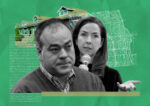Cook County Assessor Fritz Kaegi is in a public bout with Board of Review Commissioner George Cardenas over the rising property tax burdens threatening residents and business owners in Chicago.
As the city moves forward with a proposed $345 million increase in the property tax levy to address the nearly $1 billion budget deficit, Cardenas argued in a recent Chicago Tribune op-ed that Kaegi’s office has failed to provide the necessary transparency for taxpayers to understand the impacts of the 2024 triennial reassessment.
For Cardenas, the issue boils down to accountability and over-reliance on property taxes, which he says “must end.”
“This is not only a fiscal crisis — it’s a moral one,” he said.
The city’s proposed increase to the property tax levy would raise the collection from $1.774 billion to $2.119 billion, with reassessments likely to push the burden even higher. Small business owners, already operating with razor-thin margins, fear they will be forced to pass the increased costs onto customers, cut staff or close their doors entirely.
The Civic Federation has repeatedly criticized Chicago’s over-reliance on property taxes, calling it a short-sighted approach that exacerbates long-term financial instability. Cardenas believes that Kaegi’s reassessment process, combined with the city’s heavy tax burdens, compounds this unsustainable strategy.
Cardenas, who hears tax appeals cases from property owners seeking lower valuations, also highlighted broader issues with Chicago’s fiscal strategy. The city’s portion of the tax bill is about 25 percent, but the largest share — over 55 percent — goes to Chicago Public Schools. This distribution, coupled with rising assessments, places a disproportionate burden on taxpayers.
Cardenas wants Chicago to adopt practices from cities like New York and Los Angeles, which use transparent tracking platforms and regular audits to identify inefficiencies. He also called for a dedicated Office of Risk Management to oversee city spending and implement fiscal accountability measures.
He concluded with a strong call for change, urging elected officials and residents to demand greater transparency and sustainable solutions.
Kaegi responded to Cardenas’ public callout by agreeing with the need for openness but emphasizing context. Data showing how tax burdens shift across neighborhoods cannot be finalized until appeals are decided and assessments are certified, he said.
This data will be made available early next year, and historical information is already accessible online.
He also pushed back against Cardenas’ suggestion that his office lacks transparency, arguing that it shares detailed methodology worksheets to help property owners understand and contest assessments. Kaegi noted, however, that the Cook County Board of Review, where Cardenas serves, has not provided similar transparency in its decision-making processes.
Read more



Kaegi highlighted the board’s pattern of significantly reducing commercial property values during appeals, which he says shifts the tax burden onto homeowners. For example, he pointed to a 20 percent tax increase faced by the median south suburban homeowner in 2023 as a result of such reductions.
Kaegi called for shared, clear standards for assessing commercial properties, arguing that transparency from both offices is crucial for public trust.
— Andrew Terrell
